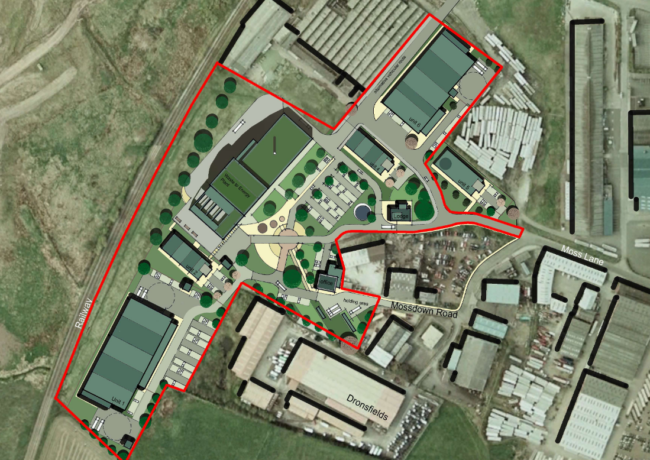Planners criticise ‘premature’ proposals for £100m Royton site
Oldham Council has been recommended to reject an application for six warehouses, an office, and an energy-from-waste plant on an industrial site in Royton, proposals for which were criticised as “premature” by planning officers.
The outline planning application by The Connell Group and Woodhouse Properties includes an office block, six industrial units, and an energy-from-waste plant which would generate between 10 and 11 megawatts of power to support local businesses.
Parts of the site alongside the Manchester to Rochdale Metrolink line are currently used as a waste recycling business, but is designated as open land under Oldham’s local plan.
Connell and Woodhouse argued the scheme would create up to 200 construction jobs during the development phase, around 50 jobs when complete, and was an investment of £100m in the area.
The application also include a full remediation of the site, which has seen illegal dumping in the past. In-fill material due to be used elsewhere has also been stored at the site “without some of the necessary permissions being granted”, according to consultants Chorlton Planning.
“The whole site has reached a point where a comprehensive development is necessary to remedy existing problem issues and to put the whole site to a beneficial use,” said the planner.
It is estimated the site would cost around £6m to remediate, and the landowner is subject to enforcement action by the Environment Agency due to the damage caused by illegal dumping.
Much of the site formerly fell within the Royton Moss Site of Biological Importance, but planning documents suggest that much of the ecological value of the site has been lost due to the dumping.
However, Oldham’s planning officers have recommended the proposals for refusal when the council’s planning committee meets tomorrow.
The proposals, planners said, would “have a high adverse impact on the character of the Beal Valley Other Protected Open Land designation,” which would not be “adequately mitigated enough to lessen the impact”.
Planning officers said the application from Connell and Woodhouse was “premature”, given the designation of the site as OPOL.
“The correct process would be for a review of the OPOL designations to be carried out and for the GMSF to be published in due course before determining whether or not the site in question is suitable for development.”
A report to this week’s committee also said the submission of the application in outline form “fundamentally undermines the case of the application” as it was unclear what the development’s final scale would be.
“Any development of the area needs to be comprehensively masterplanned and take into account the considerations of the landscape in order to mitigate the visual and ecological impacts associated with development in this area of OPOL.
“The current proposal does not do this, and as such, cannot be supported in its current form”.
Bodies that had objected to the plans included the Environment Agency, Transport for Greater Manchester, and Oldham’s highways team.
Planners also concluded the application did not take into account local flooding impacts outside the site’s boundary; that it not had not demonstrated there would not be “severe impact” on the local highways network; and that existing access to the site “would not accommodate the type and volume of traffic that will be generated” by the project.
Oldham’s planning committee is due to meet on 20 February.
The professional team on the project also includes SCP as transport planner; REC as air quality consultant; and Nicol Thomas as architect. A ground investigation report for the scheme was prepared by Demeter Environmental.




